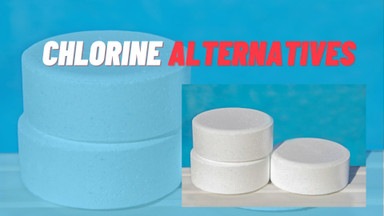Published by Matt Fichera on 10/29/2020
Chlorine Shortage 2021: Chlorine Alternatives for Your Pool
Read our Blog on Chlorine Alternatives Here.
The August 2020 fire and destruction of a chlorine factory in Louisiana caused by Hurricane Laura decimated our country’s chlorine supply. As a result of this event, many distributors have already begun to place quantity limits on retail businesses as well as increase costs. The impact of this on the 2021 swimming pool season is already starting to take shape as consumers, retail business, and pool service professionals will need to possibly seek pool sanitizing alternatives. For more information on the fire, Read our Chlorine Shortage Blog Here.
The swimming pool industry experienced one of its busiest years on record in 2020 with the majority of people stuck at home due to Covid-19. Families used the lockdown and the extra time on their hands to invest in pool and backyard projects while spending significantly more time in existing pools. The increase in pool chemical and product consumption lead to supply chain management issues, shortages, back orders, and an increased level of frustration.
In late August, just as the industry was starting to catch back up, and with constraints relaxing a bit, Hurricane Laura rolled into the New Orleans area wreaking havoc on many homes and businesses. The storm caused major damage and a resulting fire at KIK Custom Product’s Biolab plant that lasted for 3 days. Biolab is the parent company of BioGuard pool chemicals. This plant produces 115 million pounds of “trichlor” and “dichlor” per year which is roughly 40% of the entire nation’s supply. This amount of chlorine is simply too much to be removed from the equation without significant issues. Other manufacturers of these products cannot simply make up the difference. Such a large amount of product being eliminated from the market will be very impactful in the year to come.
Where does this leave the swimming pool industry? Trichlor is something that has been counted on as a disinfectant for a very long time. Luckily, for most of the country we are heading into the offseason with many pools already having been closed for weeks. There are however, sections of the country where pool season never stops, or only slows for a small period of time then it’s on to 2021.
In anticipation of this, distributors have already put their retail customers on allocation. This currently means that pool and spa businesses cannot order any more chlorine products than they did last year despite the ongoing increase and interest in swimming pools and spas. Really, there are no guarantees at this time. We have combined a shortage with elevated levels of interest amongst the pandemic. This will cause a ripple effect as other sanitization options will be impacted as solutions to fill the void created are found.
Luckily, there are other options within the pool industry to use in keeping your pool clean. It’ll be even more important to educate pool owners and inform them of the situation while also suggesting chlorine alternatives moving forward.
First and foremost is constantly promoting the need to keep pool water balanced, thus reducing the need for as much chlorine use. Keeping your water healthy allows what’s being used to be more efficient while optimizing and eliminating big swings in the chemistry of the water.
Chlorine generation using salt systems has already been rising in popularity in recent years but will be even more so in 2021 and beyond. Our Blog on Salt goes more in depth on the subject but basically through the use of an electrical current when exposed to salt actually produces chlorine in your pool water. Gone are the days of lugging tablets and granulated chlorine from the store to the pool with you only having to worry about replacing the salt cell every 5 to 9 years depending on bather load and water health. If you are choosing to go with salt just don’t forget that you still have to monitor and balance the other aspects of your pool water. Take a look at our salt systems available for purchase:
Using borate can also help manage your pool’s chlorine use. Our Blog on Borate goes more in depth on this but borate helps maintain a pool’s pH helping chlorine to be more efficient. Also, if you are using a salt chlorine generator, a bi-product of this is caustic which borate helps keep in check by acting as a buffering agent.
Relying on enzymes would also be a very proactive approach to conserving chlorine as they attack and break down oils in the water which frees up more chlorine for disinfecting purposes. Read Our Blog on Orenda Products that utilizes these enzymes.
Other proactive actions that can help manage a pool’s chlorine include regular activities such as running the pump, chemically cleaning the filter, double checking to make sure that you are using all of your chemicals correctly, regularly testing your pool water, and learning about proper care along the way. Our Blog on Pool Maintenance takes a deeper dive into some of this.
Investing in a variable speed pump, if you haven’t already, will also benefit you through this chlorine shortage. Our Many Blogs on Variable Speed Pumps go into greater detail but basically the well known saying “A rolling stone gathers no moss” applies here. Water that is constantly moving is substantially less likely to become contaminated when compared to stagnant water or water that is only moving during selected times that a pump is on. A variable speed takes care of this by running the pump at different speeds thus saving you electrical costs as well as chemical costs in the long run.
Many people that own pools have been managing them successfully for years by implementing certain methods that work for them. Changing the way that you do things is sometimes easier said than done but for the foreseeable future you may not have a choice. Our team at EZ Pool & Spa Supplies is more than happy to work with you on finding chlorine alternatives and to answer any pool related questions that you may have. Contact Us Here or reach out to any of our retail stores as well.









